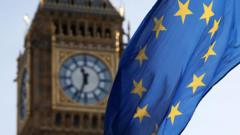As the UK government prepares for a significant summit with EU leaders, discussions revolve around crucial areas such as security, trade, and immigration, sparking debate about a possible shift in Britain's post-Brexit stance.**
Britain's Strategic Shift: Is a Closer EU Relationship on the Horizon?**

Britain's Strategic Shift: Is a Closer EU Relationship on the Horizon?**
The upcoming summit marks a potential turning point in UK-EU relations, reflecting a nuanced approach to post-Brexit cooperation.**
In a notable moment for post-Brexit UK-EU relations, discussions are set to take place during an upcoming summit held at London's historic Lancaster House. This gathering, which is the first of its kind since the UK’s departure from the EU, signals an intent for renewed cooperation between the two entities. Key issues on the agenda include security partnerships, the ongoing conflict in Ukraine, and potential reforms in trade, particularly in respect to food regulations.
Historically, UK prime ministers frequently attended EU summits in Brussels, laying the groundwork for collaborative efforts across various sectors. However, following Brexit's tumultuous divorce from the EU, these high-stakes meetings dwindled significantly. Current Labour officials, driven by a manifesto pledge for closer European ties, aim to revitalize this connection.
At the center of discussions will be the significant prospect of a UK-EU security pact, a theme advanced by EU foreign policy chief Kaja Kallas, who emphasizes the need for allies to bolster their relationship amidst global tensions. Nevertheless, dissenting opinions exist; some critics argue that NATO remains the bedrock of security and that additional partnerships may dilute the UK's position.
The issue of border regulations, particularly regarding a proposed veterinary deal to eliminate certain food checks, is equally contentious. Adversaries within the Conservative Party contend that such an agreement compromises the UK’s independence, while proponents argue it could alleviate burdens on UK businesses post-Brexit.
Furthermore, innovative proposals like a youth mobility scheme could reshape the dialogue around immigration, emphasizing a need for a modern approach to young individuals' potential fluid movement across the continent.
As the countdown begins to the summit, the implications of these talks for the future UK-EU relationship remain profound. Political leaders are poised between trade-offs that may either symbolize a progressive realignment with Europe or ignite backlash around perceived concessions. Economic implications, particularly for the defence and food sectors, are anticipated to echo through subsequent negotiations.
While the path forward is complex and laden with potential pitfalls, some analysts assert that this renewed effort towards closer UK-EU ties may offer both nations a strategic advantage amidst evolving global dynamics. As Lancaster House once again plays host to political dialogue, the stakes are high for a future where Britain's European connections may become more significant than previously envisaged.




















